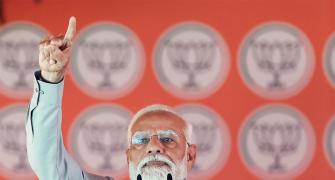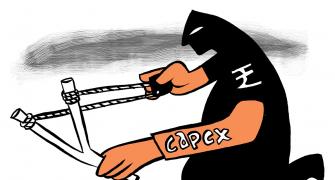Two of the four public sector undertakings in the pharmaceutical sector -- Rajasthan Drugs and Pharmaceuticals Ltd (RDPL) and Hindustan Antibiotics Ltd (HAL) -- are getting into the fast-growing segment of anti-retroviral (ARVs) drugs, used in the treatment of AIDS.
Announcing this, Union Minister for Chemicals and Fertilisers Ram Vilas Paswan said RDPL would launch six ARVs and HAL, three. The entry of the PSUs into the Rs 3,000-crore (Rs 30 billion) market is certain to bring down prices, given that they intend to price their drugs 20 per cent cheaper.
There is already a downward pressure on ARV prices as a result of Gilead Sciences, a US-based multi-national, entering into seven licensing agreements with Indian companies to make and market tenofovir.
The entry of the two PSUs into the ARV segment is part of a plan to revive them. All four pharma PSUs -- the other two being Indian Drug & Pharmaceuticals Ltd (IDPL) and Bengal Chemicals & Pharmaceuticals Ltd (BCPL) -- are sick. Chances are that IDPL and BCPL will also enter the ARV segment.
The HIV-infected population in India touched an alarming 5.7 million in 2005.
The department of chemicals and petrochemicals has put in place a "preferred procurement policy" for 102 formulations made by the pharma PSUs and their subsidiaries for a period of five years.
Of the total central and state purchases of Rs 3,500-4,000 crore (Rs 35-40 billion) through the bulk procurement scheme, the pharma PSUs are expected to secure 10 per cent.
Paswan stated that his ministry had also approached the Prime Minister's Office for a reduction in the excise duty on drugs from 16 per cent to 8 per cent -- a demand that didn't find its way into the Union Budget -- and would be putting in place riders to ensure that the duty cut translated into lower prices for consumers.
The Indian Drug Manufacturers' Association, which represents small and medium drug-makers, has said that it will lower drug prices in case of a duty cut. The finance ministry had earlier objected to the proposal citing loss of revenue.
Paswan was confident that with all industry associations agreeing to cap trade margins on "branded generics" and "generics generics" -- constituting roughly 7 per cent of the Rs 35,000-crore (Rs 350 billion) domestic pharma market -- at 15 and 35 per cent for wholesalers and retailers, respectively, from October 2, the prices of drugs will fall by up to 70 per cent.
These include drugs like Cetrizine, Omeprazole and Nimesulide.
"The industry has agreed to the government proposal of fixing margins on drugs which are promoted by the trade route from October 2," Paswan said.
Different industrial bodies have said that they will fix margins for retail at 35 per cent and 15 per cent on wholesale for drugs which the companies give responsibility to distributors for promotion without fixing any margins.
"As a result of this agreement, we expect a substantial fall in the prices of these commonly used drugs," Paswan said.








